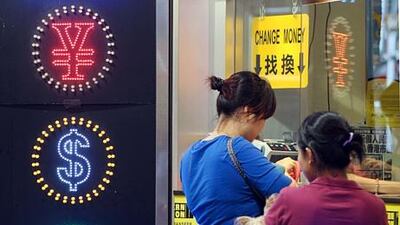Concerns over the value of Beijing's currency appear to be fading, giving ground to newer issues such as cyber security and the theft of trade secrets.
For years the currency issue grabbed the spotlight in relations between the United States and China, and some US legislators continue to argue a weak yuan is robbing jobs from Americans. But action to force a change is unlikely and the issue will probably remain on the back burner as long as the US economy continues to improve.
An increase in the value of the yuan, a big drop in China's global trade surplus and a rise in labour costs that has made Chinese products less competitive have conspired with a pickup in US job growth to take the wind out of Washington's sails.
On top of that, the US has faced fury from other countries for an aggressive easing of monetary policy that critics contend seeks to drive down the dollar, a charge that puts Washington in a tough spot to criticise Beijing.
"China's currency regime has ceased to be a flashpoint in US-China economic relations," says Eswar Prasad, a senior professor of trade policy at Cornell University and a former IMF official.
Mr Prasad says the president Barack Obama's administration has shifted its attention to issues such as increased market access for US manufacturing firms and financial institutions that want to do business in China, and better protection of intellectual property rights.
Mr Obama, attacked during the presidential campaign by challenger Mitt Romney for failing to label China a currency manipulator, did not even address the issue in his recent state of the union speech.
But he came out swinging on cyber-security concerns in remarks that appeared to be directed at China.
"We know hackers steal people's identities and infiltrate private email. We know foreign countries and companies swipe our corporate secrets … We cannot look back years from now and wonder why we did nothing in the face of real threats to our security and our economy," said Mr Obama.
In recent years, both the house of representatives and the Senate have passed bills to give Mr Obama new tools to push China into letting the yuan rise faster in value, but neither made it all the way to his desk to sign into law.
The latest legislative effort was stopped dead in its tracks by the house speaker John Boehner, an Ohio Republican, who said he feared it would start a trade war. Mr Boehner's opposition and the yuan's strengthening has drained energy in Congress to deal with the issue, says one congressional aide who has worked on the issue for years.
US preoccupation with its own fiscal problems also may have helped to push China off America's political agenda, says Nicholas Lardy, an expert on the Chinese economy at the Peterson Institute for International Economics.
"But I hope the most important reason is that China has allowed their currency to appreciate a significant amount, and more importantly their [trade] surplus, as measured by the current account, has come down quite dramatically," Mr Lardy says.
Since mid-2010, China's exchange rate, adjusted for inflation rates in the US and China, has risen 16 per cent against the dollar, according to the US treasury.
At the same time, China's current account surplus, the broadest measure of its trade with the rest of the world, has fallen from a peak of 10.1 per cent in 2007 to a preliminary reading of 2.6 per cent in 2012. That makes it hard for Washington to continue to argue the yuan is significantly undervalued, even if the US trade deficit with China grew to a record US$315 billion (Dh1.15 trillion) last year.
Phillip Swagel, a former treasury official now at the American Enterprise Institute, says the Federal Reserve's extraordinary easing of monetary policy is yet another factor cooling Washington's appetite for criticising Beijing. "This makes it harder for American officials to criticise other countries."
The IMF, in its first published estimate in July 2012, said China's yuan was undervalued by 5 per cent to 10 per cent, much less than 25 per cent to 40 per cent figures touted by many US legislators for years.
Critics say that was a politically derived estimate since China has a powerful voice on the IMF. But since then, the yuan has risen further against the dollar and Chinese officials promised further reforms to allow more exchange rate flexibility.
* Reuters

